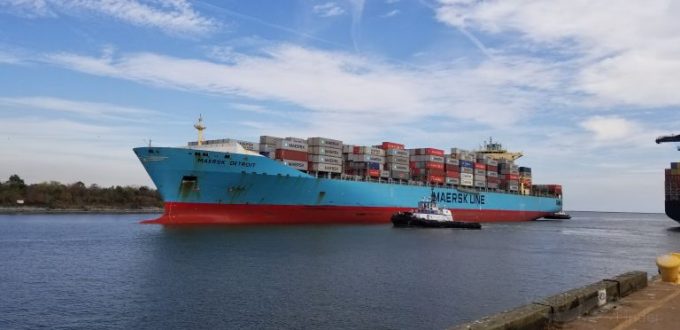Threat of rising oil price adds to frustration for crisis-hit supply chain chiefs
New warnings from the World Bank of surging oil prices, adding to the continuing instability ...

A week after US president Joe Biden admitted airstrikes were not preventing Houthi attacks on shipping, another missile attack last night forced two Maersk vessels to abandon their naval convoy and flee the Red Sea.
US-flagged Maersk Detroit (pictured above) and Maersk Chesapeake were under escort by US naval vessel USS Gravely and were carrying military supplies when Houthi militants attacked them with a barrage of missiles.
Maersk said: “Both ships reported seeing explosions close by and the US Navy accompaniment intercepted multiple projectiles.” It added that Red Sea transits by its US subsidiary were suspended “until further notice”.
Some 22 naval vessels are patrolling the Red Sea under the auspices of Operation Prosperity Guardian. Meanwhile, the US and UK have conducted at least eight airstrikes on Houthi targets since the campaign began.
“These precision strikes are intended to disrupt and degrade the capabilities the Houthis use to threaten global trade and the lives of innocent mariners,” said a joint statement by the US and UK.
But these operations seem to be showing little evidence of deterring the Houthi rebels, who have weathered airstrikes by Saudi Arabia almost continuously since the civil war in Yemen began in 2014.
US attempts to persuade China to apply pressure on Iran, the Houthis’ benefactor, have been unsuccessful, but yesterday the Chinese foreign ministry told the UK FT it had been “in close communication with various parties and worked actively to alleviate the tension in the Red Sea”. It also reiterated a call for an end to “disturbance to civilian ships” and called upon “the relevant parties… to avoid adding fuel to the fire”.
Israeli carrier Zim this week launched a standalone express container service, the Pacific Northwest Express (ZPX), between Vietnam’s Cai Mep and Vancouver, Canada. GSL Valerie departed on Sunday on the new service’s inaugural voyage.
The Loadstar’s Mike Wackett said the new Zim express service would likely cater for premium-rated urgent shipments where the carrier would guarantee to supply equipment, which is now becoming scarce in Asia.
Zim Europe, a vessel previously bound for Port Klang but banned by Malaysia’s pro-Palestine government, is also making its way from Cai Mep, apparently to the Israeli port of Haifa, according to AIS data.
The Suez Canal Authority (SCA) saw vessel traffic fall 30%, and revenue by 40%, between 1 and 11 January, according to Alphaliner data. SCA chairman and MD Ossama Rabiee ruled out discounting canal fees, saying this would be insufficient, given the current scenario, to attract more customers.
Comment on this article